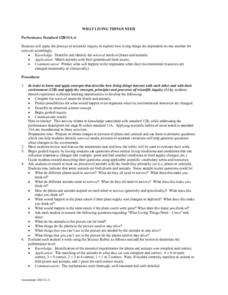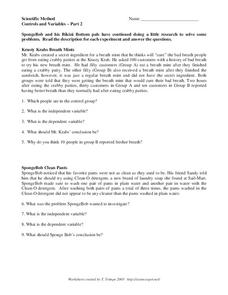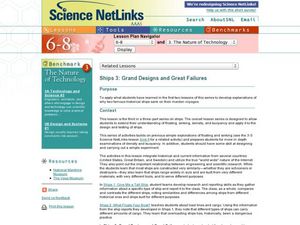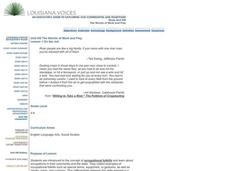Curated OER
Scientific Method, Control and Variables
Middle school scientists bathe in Bikini Bottom with SpongeBob and friends. They define steps in the scientific method. They identify independent variables, dependent variables, and the control for science experiments being carried out...
Curated OER
Oat Seed Lab: A Model Scientific Experiment
Students investigate seed germination. In this lesson on scientific prediction, students conduct a scientific experiment using oat seeds.
Intel
Insects: The Good, The Bad, The Ugly
What would the world be like with no insects? Ponder this question using a research-based STEM unit that encourages scholars to investigate insects from both a beneficial and hazardous perspective. They learn about insect behaviors,...
Curated OER
The Good and Bad Bacteria
Students are able to name one kind of harmful bacteria and why it hurts us and also name one kind of helpful bacteria and how we use it. They describe the process of growing bacterial cultures in a lab. Students create a reasonable...
Curated OER
Bacteria: The good, the bad, the ugly
Seventh graders conduct an experiment. In this bacteria lesson, 7th graders list living and nonliving things and brainstorm the characteristics they share. Students are divided into two groups where they put samples of hand soap and...
Curated OER
Scientific Problem Solving
In this problem solving worksheet, students will conduct an experiment to answer this question: "How does watching too much television affect us?" Students will form a hypothesis, collect data, analyze their data, and draw a conclusion....
Curated OER
Who's Afraid of the Big, Bad Wolf?
Young scholars compare wolves' behaviors to those of the human race. In this wolf lesson students write a story that will show that wolves are either good or evil.
National Center for Case Study Teaching in Science
Bad Blood
When it comes to science and medicine, ethics should always be a primary consideration; unfortunately, that has not always been the case. There are countless examples throughout history of questionable medical practices, marginalized...
Curated OER
What Living Things Need
Young scholars apply the process of scientific inquiry to explore how living things are dependent on one another for survival. They match animals with their generalized food source. Students predict what happens to the organisms when...
Curated OER
Fast Fats: A Nutritional Analysis of America's Obsession with Fast Foods
How do you read a nutritional label? Help high schoolers practice reading nutritional labels on foods so they can calculate the calories in different types of foods. They will also examine the effects of fat on the body and the link to...
Curated OER
Scientific Method
In this Scientific Method worksheet, learners identify controls, variables and conclusions given experiment descriptions. Students interpret data given in charts.
Curated OER
Antibiotic Resistance
Students using the scientific method, study bacteria as a covering surface of the earth in many forms. They discover that not all bacteria is bad and introduce the topic of antibiotic resistance. Science Fair expectations are addressed.
Curated OER
Cells Behaving Good or Bad
Students study cellular behavior. For this cell lesson students identify and develop a research question, collect data and formulate conclusions.
Curated OER
Ice
Students examine the different propereties of ice, such as freezing temperature. In this scientific lesson students complete several activities using ice, like making ice cream.
Curated OER
The Halls are Alive with the Sound of Music
Students discuss physical places in which had good or bad acoustics. After reading an article, they discover the relationship between the physics of sound and concert hall acoustics. They calculate the speed of sound and compare their...
Curated OER
Simulating the Greenhouse Effect in a Terrarium
Students identify what factors effect global warming and how the greenhouse effect occurs. In this environmental lesson plan students view videos then complete an experiment using a terrarium to observe greenhouse gas.
Curated OER
Why Is My Bread Fuzzy?
Students explore the organisms that live on counters or surfaces in the classroom. In this mold experiment, students observe mold in different conditons. Students record their observations on a worksheet. Students understand how mold...
Curated OER
The Impact of Invention
Young scholars explore the impact of invention. In this invention instructional activity, students examine how inventions are on going and affect all aspects of life in both good and bad ways. Young scholars will research the history of...
Curated OER
Inventions 2: The Impact
Learners research inventors and inventions and their impacts. In this invention lesson, students research inventions and their affects in good and bad ways.
Curated OER
Sweet Science: How Sugar Molecules are Manipulated in Candy Making
Students investigate how heat affect sugar solutions. In this science activity, students compare the sweetness of different types of sugars. They research the development of sugar and create a timeline.
Curated OER
On the Job
Young scholars identify the concept of occupational folklife and learn about occupations in their community and the state. Then they collect examples of occupational folklife such as special terms, equipment, or gestures, as well as...
Curated OER
Thinking About Newton's 1st Law
Students discuss the lives of both Aristotle and Newton in order to bring important differences between the two to the forefront. They evaluate two statements about motion and use the ideas from the discussion to determine which...
Curated OER
How Do Cells Reproduce?
Students discuss the importance of reproduction of cells. They identify and describe the stages of Mitosis. They discover what happens to chromosomes and DNA during reproduction.
Curated OER
Zebrafish as a Model for Muscle Development
Students explore the steps of protein synthesis in zebrafish. They view video clips to identify the parts of a zebrafish and observe them as they sequence the developmental stages. In groups they identify the muscles and how proteins are...

























